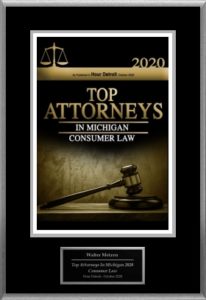Contents
THE CONFIRMED CHAPTER 13 BANKRUPTCY PAYMENT PLAN: NOT ETCHED IN STONE
The Chapter 13 bankruptcy process consists of 2 separate stages: (1) the “pre-Confirmation” stage; and (2) the “post-Confirmation” stage.
When you initially file your Chapter 13 bankruptcy case, you are in the pre-confirmation stage of the proceeding.
This is the stage in which you file your Chapter 13 bankruptcy petition, your initial Chapter 13 bankruptcy payment plan, and in which you submit all of the required financial documentation to the Chapter 13 Trustee assigned to your case
Around 30 days into this stage, you will enjoy your first Chapter 13 bankruptcy hearing: the 341 Meeting of Creditors.

A Chapter Bankruptcy 13 plan can be modified anytime during the life of the 3 to 5 year plan.
This is a non-judicial hearing at which you, your Michigan bankruptcy attorney, and a representative of the Chapter 13 Trustee (or the Trustee himself or herself, depending on the city in which you file) meet at the Bankruptcy Court. The Trustee must have your documentation well before the scheduled date of this 341 Meeting.
At the 341 Meeting, you (yes, you: not your bankruptcy attorney) will answer a series of questions asked by the Trustee and by any creditors who wish to appear. Your responses are recorded and a transcript generated for evidentiary purposes.
The questions you are asked will pertain to your income, expenses, assets, household size or members, employment, allegations you’ve made in your filed petition and Chapter 13 plan—and virtually anything else that the Trustee wishes to ask of you.
Once the 341 Meeting is concluded, the Chapter 13 Trustee may or may not file 1 or more Objections to the “confirmation” of your Chapter 13 plan.
In Detroit, the Chapter 13 Trustees simply will file objections. In Flint or Bay City and elsewhere, the Chapter 13 Trustees do not necessarily do so as a general tactical matter as they do in Detroit.
It is an irksome tendency, and, often, the objections are frivolous. However, an experienced Detroit bankruptcy attorney such as Attorney Walter Metzen is accustomed to it and will steer you through this minefield.
Once the objections are resolved, whether through negotiation and pleadings amendment or through oral argument before a Bankruptcy Court judge at a second “confirmation hearing,” your Chapter 13 Plan will be “confirmed” by the Court.
You then enter the second, “post-Confirmation” stage of the Chapter 13 Proceeding.
But what is “confirmation” of the Chapter 13 Plan?
MICHIGAN CHAPTER 13 BANKRUPTCY: THE EFFECT OF AN ORDER CONFIRMING A CHAPTER 13 PLAN
Confirmation is judicial approval of your Chapter 13 payment plan.
In circumstances not requiring a contested argument before the judge to obtain Confirmation, you, the Chapter 13 Trustee, and any objecting creditors (yes, they can object to confirmation also) negotiate and respectively sign a proposed “Order Confirming Plan,” or “OCP.”
This OCP is submitted to the judge, who, generally, all of the parties being in agreement as to the provisions, will then sign off as well.
The OCP is, therefore, an Order of the Court, binding on all parties—including you. Any issue that was argued or could have been argued by any party prior to Confirmation is, at this point, res judicata—or judicially resolved.
That is to say, the argument can’t be raised any longer. Everyone had their chance.
You may have filed 1 or more amended Chapter 13 Plans or petition schedules in order to obtain the signatures needed upon the OCP. The OCP itself may contain language amending certain terms of the filed Chapter 13 Plan.
The latest Chapter 13 Plan filed and the terms of the OCP signed by the judge contain the entirety of the rules and requirements of your particular Chapter 13 bankruptcy proceeding—along with the Bankruptcy Code, Local Court Rules, and Bankruptcy Rules of Procedure.
In that respect, the Chapter 13 Plan is now “etched in stone”—except that it isn’t.
When there is a change in your circumstances, you can still modify the Chapter 13 Plan, even post-Confirmation.
MICHIGAN CHAPTER 13 BANKRUPTCY: WHEN CAN YOU MODIFY A CHAPTER 13 PLAN?
In the post-Confirmation stage of a Chapter 13 bankruptcy proceeding, a Confirmed Chapter 13 Plan can be modified either by the debtor who filed the bankruptcy or by another “party in interest” (such as the Chapter 13 Trustee or a creditor) if the debtor’s circumstances change.
What circumstances?
The debtor’s income, expenses, and employment are the usual points of circumstantial change. The debtor’s health condition, or the health condition of a spouse or other dependent can also provide a sufficient change in circumstances to justify a plan modification by the debtor.
A needed essential one-time expense, such as a car repair or replacement or medical procedure, can additionally justify a plan modification of a limited variety.
A plan modification can be permanent insofar as it may alter the plan for the balance of its 3-6-year duration, that is, or it can take the form of a limited change, such as the forgiveness of a single payment or the forgiveness of another plan requirement, such as the turnover of a given year’s tax refund to the Trustee.
Judges in the Eastern District of Michigan have ruled that a change in circumstances need not be “serious” or “significant” to support a proposed Chapter 13 plan modification—but the change must have occurred post-Confirmation.
That said, a plan modification is not an ON/OFF switch. It is essentially a motion that is filed by a party requesting a change to the Plan or OCP by way of court approval. Whatever party files the proposed plan modification, other parties may object, resulting in a contested proceeding no different than any other motion filed in US Bankruptcy Court.
As your bankruptcy lawyer is likely being paid on an hourly basis from the funds that you pay monthly into the Chapter 13 plan, you will want to discuss the cost-efficiency of any modification with your bankruptcy attorney prior to proceeding with it.
It doesn’t do you much good to ask for forgiveness of a single monthly plan payment if your attorney believes that the Chapter 13 Trustee will object, requiring oral argument at a court hearing on the subject, if the extra time and costs expended by your attorney are going to necessitate a separate modification to increase your plan payment—just to pay your attorney’s fees.
POST-CONFIRMATION CHAPTER 13 PLAN MODIFICATION: THE BOTTOM LINE
The bottom line is that a Chapter 13 bankruptcy proceeding is not an iron cage in which you are imprisoned for 3-5 years. If your life changes, your Chapter 13 payment plan can change with it. In rare circumstances, a Chapter 13 hardship discharge may be granted by the bankruptcy Judge.
However, the change must be necessary—and it must be worthwhile in terms of dollars paid to your attorney for the trouble. 
Attorney Walter Metzen is a Board Certified Bankruptcy expert and has successfully guided thousands of clients through the Chapter 13 bankruptcy process in Michigan.
The Law Offices of Walter A. Metzen & Associates offers free consultations for those interested in the bankruptcy process and is experienced in determining and advising as to the best course of action when filing Chapter 7 or Chapter 13.




